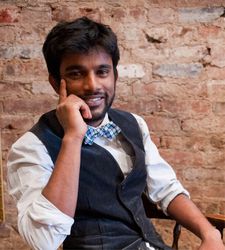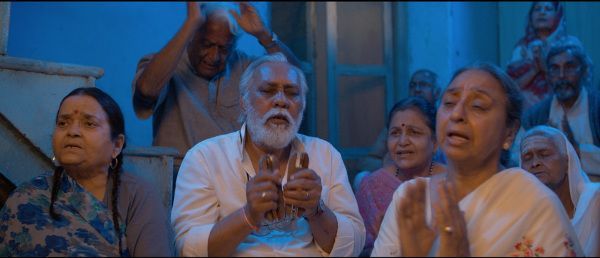Amber Wilkinson: Tell me about the origins of the story. How did you find out about these hotels in Varanasi and what inspired you to write about them?
 |
| 'I don’t want to have any boundaries in terms of where my movies are set and what they are' Photo: Robert Braunfeld |
I heard one story about a son who had to bring his father her and that really moved me and the seed of the story started from there.
AW: When you researching it, were you surprised that people stayed longer than 15 days, hanging around for as long as it took to die?
SB: I was surprised. I think it’s funny that they had the rule itself, and I think there were instances where people get turned away after 15 days. But more often than not, people stay. There are so many accounts of people who can feel when they are going to die. More often than not, people do end up staying less than 15 days - they attain salvation, as we say in the film. There are times when people turn away, but they come back. That’s where the drama of the film lies, what’s going to happen with these guys, are they going to stay or go? I felt like I could make 20 different films about this hotel because each story was so different.
AW: You do keep the action quite confined, which is fairly unusual for films that are set in India. They can be quite sprawling and taking in quite a lot of extended family detail. Why did you decide to confine the action and the cast in that way?
SB: I didn’t want to make a documentary on the place. I wanted the space to become a character and to focus on the characters on an emotional level. So it was a conscious decision to keep my focus, even during the editing process, on the characters and the emotional thread of the story rather than meandering too much.
AW: Quite often there’s a lot of bustle going on in Indian films, in contrast yours is a quiet film, despite being set in a big place.
AW: How easy or difficult was it to shoot the film, because you’re in quite confined spaces?
SB: Every challenge brings out its own visual quality. If the room is small and you shoot it there, it feels small, so you get a real sense of the space. It was a huge challenge for us because obviously you are limited in where you can move and how many crew you can have inside and if the camera can move at all, because in some of those spaces it can’t. We shot in places you’re not allowed to shoot in and shot a lot of putting the actor there and going with the environment and letting that atmosphere take over. It was a huge challenge logistically. But, I think it’s great to have some confines, because it makes you think in a different way. It makes you create compositions that you wouldn’t if you had all the freedom in the world. We wanted to bring life and colour to death and the space really helped in bringing that out.
AW: I’m interested in the balance between faith and family in the film. How important was it for you to make sure the real world was represented as well as the spiritual?
SB: I knew I never wanted to make a film that felt philosophical or spiritual because being in that space and talking to people, I found a very human quality to it. Even though there is the context of religion, I don’t really think it takes over. I can freely admit that I don’t think any of us really understand death, we don’t know anything in a way. I knew I was more focused on getting into these people’s lives and how the decision of going to this place affects these people’s lives and brings out there past. I wanted to try to do that with humour and storytelling, because in a film like this it’s very easy to lose the engagement of a person. I had to be conscious of dealing with dark subject matter but not letting it take over too much.
AW: How did you cast the film? Did you have people in mind?
SB: The casting process was very difficult because I had very few characters, so I had to focus on getting the characters right. For me, it was always about on finding the right people who could embody the spirit of the character. For instance, I chose Adil Hussain, who’s in Life Of Pi, for one, because I’d never seen him do something like this, so that was something that excited me. Also, when I met him, there’s a kind of vulnerability to him and I believe in his talent to completely transform the character and the film. The interesting story was of the daughter Sunita. I was at a film conference at a panel where composer AR Rahman was talking. Palomi Ghosh asked a question and he asked her to sing and she started to sing in a room of 1000 people, kind of like an audition. At first I was, like, I don’t know how this is going to go but then she made everyone in the audience start clapping and completely took over the room. I realised, this is a random girl, taking over a room from AR Rahman, and for me, that was such an important aspect of casting her. I didn’t audition her because I knew she had the spirit I wanted my character Sunita to have. The supporting cast was mostly based in Varanasi, so a lot of non-actors and we had a lot of people who live in these hotels.
AW: How was the Biennale process?
 |
| SB: 'Adil Hussain... when I met him, there’s a kind of vulnerability to him and I believe in his talent to completely transform the character and the film' Photo: Courtesy of Venice Biennale College |
If someone had told me two years ago I would have said: “I don’t think I can do it. It’s impossible.” But when you’re in it, it becomes like a war with yourself. You just find a way to make things happen.
AW: What do you think about the state of India cinema, it seems to be having a resurgence with new voices and more unexpected stories?
SB: I think I’m so fortunate to be making films in this phase of cinema in India. There are a lot of young people that are making great films that are being well received all over the world. Even to the extent that people who have been making films for 20 years are taking notice and learning from that – there’s a very healthy exchange happening right now between them. I think we must stick together, because together we can bring great Indian stories to the world.
AW: Are you working on future projects?
SB: I made this film in a very short amount of time and in a very intense way. There is one project that I’ve started to develop – it’s set in New Zealand. It’s very early to talk about it but it’s a thriller.
AW: So you’re interested in different genres, because your first film was more of a documentary.
SB: I have a curse of liking many things as a person. So if something moves me, it could even be from a place of fear, I could make a horror tomorrow. I don’t want to have any boundaries in terms of where my movies are set and what they are. Not being too overly educated in the genre, I’m just going to let my instinct take over and hopefully bring something new to the genre. I think it’s really interesting when someone with a tendency to have a different voice tries something different, it kind of makes this crazy fusion thing.
Hotel Salvation is out in UK cinemas now.









_225.jpg)













